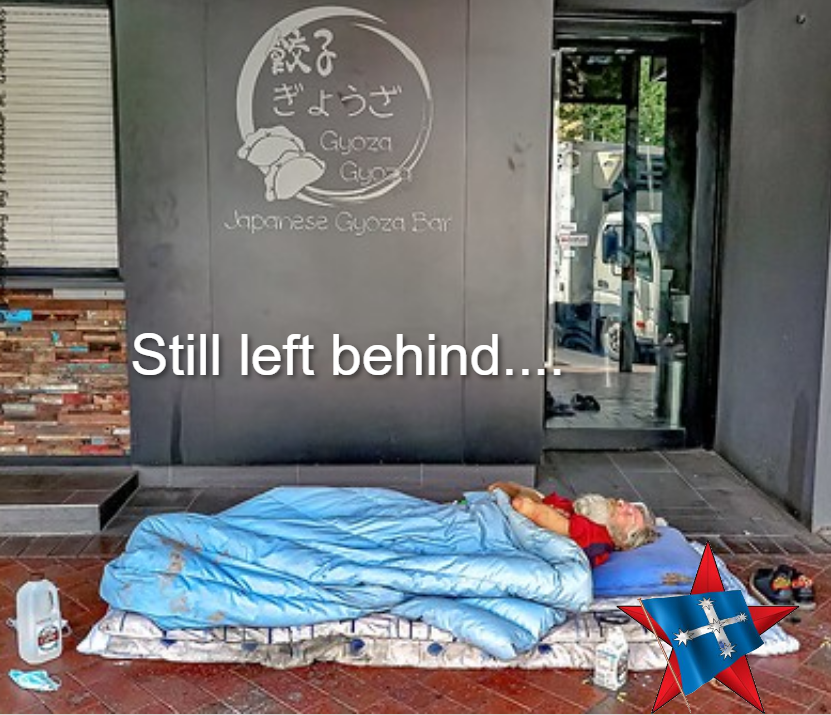Poverty in Australia: more entrenched than ever
Written by: (Contributed) on 19 March 2024
Original photo by Fernando Goncalves
Some recent studies have revealed just how much the Australian working-class have lost in the past few years with rampant inflation which has undermined living standards. Lower socio-economic groups have been particularly hard-hit. While economists continue to discuss the likely causes of the problem, the seriously dysfunctional nature of the Australian capitalist economy would appear the likely outcome of being part of the imperialist globalised economy.
A recent study conducted by the Australian Bureau of Statistics (ABS) has found 970,000 Australian workers were employed in multiple jobs, up by 13,600 compared to the previous quarter ending last December. (1) Many Australian workers find it difficult, if not impossible, to retain their living standards with one job. Australia, in recent years, has been hard-hit with soaring price/profit inflation levels which have reduced spending power by as much as 20 per cent to 25 per cent.
Australian workers have experienced a drastic wage-cut.
While Australia has a total workforce of 14,201,300, the participation rate has remained relatively constant at 66.8 per cent. In reality, therefore, the workforce is only 9,486,468. (2)
Using the official government statistics as the benchmark, therefore, a total of 10.23 per cent of the Australian working class cannot financially survive with only one job.
The what extent the second jobs remain outside the usual structured and policed economy with recorded wages and entitlements together with income tax and super being paid and non-official work with payment in the form of cash-in-hand is difficult to accurately establish. The latter, nevertheless, is a factor which has to be taken into account together with the problem of wage-theft.
A further problem workers experience when employed in more than one job is that entitlements for injuries are affected; income protection insurance for main employment, for example, does not apply usually apply if a worker is injured in a second job. If the second job is in the informal economic system, serious legal and liability issues automatically arise during the subsequent investigation.
The official statistics are all the more appalling when taking other criteria into account.
Those employed on the casual basis or precarious levels of employment, while sometimes earning high wages, usually lack credit ratings to raise a mortgage to buy their own homes. They are, subsequently, frequently found in rental accommodation. A recent study conducted by PropTrack has established rental affordability is now at the worse levels since records began. (3) While the average national median household income has increased 19 per cent during the 2019-24 period, rents have increased by 38 per cent during the same period. (4) Last year an ABS study found city rents across Australia increased by an average of 7.3 per cent. (5)
Soaring interest rates have also exacerbated the problem, with the age of cheap credit well past. Many Australians with credit card debts now experience serious financial difficulties.
While economists continue to argue about the causes of the price/profit inflation, a common theory is that it has been the natural outcome of a financial stimulus by the then Trump administration in Washington, designed to ease the problems caused by the COVID pandemic. It was noted 'every year from 2017 when Trump took over from Obama, his administration increased the federal deficit significantly, ultimately adding more to US debt than all former US presidents combined'. (6)
Due to the globalised economy, the problem quickly spread through financial and banking systems to those countries such as Australia which remain strongly linked to the US.
At the top-end-of-town, however, unequal distribution of wealth has continued to be a serious problem. The rich and wealthy continue to expand their portfolios well above levels of inflation while giving their workers wage increases below half that of existing inflation rates! (7) There is no sign the problem of price/profit inflation will end in the near future.
1. Multi-job record a sign of bad times, The Weekend Australian, 9-10 March 2024.
2. ABS: Australian Workforce, January 2024.
3. Rental crisis worst on record, The Weekend Australian, 9-10 March 2024.
4. Ibid.
5. Quoted: Prefabricated and build-to-rent houses, The Conversation, 12 March 2024.
6. Trump or Biden? It won't matter to the US economy, Australian, 14 March 2024.
7. Website: Forbes List, where the rich openly flout their wealth and gloat over their ill-gotten gains; information about what they pay their workforces can be accessed through the ABS and trade-unions.
Print Version - new window Email article
-----
Go back
Independence from Imperialism
People's Rights & Liberties
Community and Environment
Marxism Today
International
Articles
| Why Australia’s “deforestation” ranking ignores deforestation |
| SA toxic algal bloom persists under wintry conditions |
| Drought |
| Book Review: Terraglossia |
| Residential aged care - for people's needs or private profit? |
| The challenge of environmentalism in modern Australia |
| Fleurieu Peninsula marine deaths a sign of global warming’s existential dangers |
| Palestinian cultural day in SA |
| Federal government breaks critical environmental promise |
| Book Review: Mood Machine The rise of Spotify and the costs of the perfect Playlist |
| Albanese to weaken environment laws for foreign salmon farmers |
| Listen to people so as to improve mass work |
| The cars that ate suburban streets |
| Woolworths and Coles face working-class backlash |
| Book Review: Juice, by Tim Winton |
| People's Health and Safety More Important Than Nuclear Power |
| New Government Housing Scheme - Does It Create Affordable Housing? |
| US Capital Eyeing Rented Apartment Market |
| American mining giant destroys Australia’s native forests |
| The financial black hole that is AUKUS |
-----

